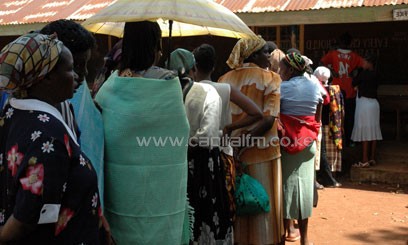Farida unlike the outspoken Monica looks shyly at us over the rim of her cup.
“Talking about it frees me,” she says hesitantly.
She gets as far as saying she too lived and still lives in Kibera and that she too was raped during the post election violence then she clams up.
“I don’t think I want to go on,” she says pleading with her eyes for me to understand.
When she got up in front of the room she had shared she was violated by four men.
“What is the government going to do to make sure it never happens again?” she had asked.
Saida Ali is the Executive Director of the Coalition on Violence Against Women (COVAW). COVAW is behind the ‘use my ballot not my body’ campaign.
The campaign is intended to run alongside the general election campaigns which according Independent Electoral and Boundaries Commission (IEBC) calendar end on February 23.
In that time they hope to collect one million signatures…signatures they hope will prompt the government to take action against gender based violence and in response to it before the general elections.
“Should the next general elections erupt into violence there should be a safe corridor rape victims can use to access PEP.”
PEP as it is most commonly referred to stands for Post Exposure Prophylaxis; an antiretroviral treatment that should ideally be given to rape victims within 72 hours to reduce their risk of contracting HIV.
“I received counselling together with other rape victims at the Kenyatta National Hospital following the post election violence and a good number of them contracted HIV and their husbands left them,” Monica chimes in.
“A lot of these women got pregnant,” Saida continues.
Lisa, the third rape victim at the table hasn’t said much. Now she quips, “shouldn’t the government compensate those women? IDPs (Internally Displaced Persons) were compensated why shouldn’t they?”
And it is this reasoning that has Monica and Farida taking the government to court.
“I’ll show my face then,” Farida seeks to assure me.
Lisa was raped in 2009. She got pregnant and now she has a three year old boy.
“When he asks me who his father is, it’s psychological torture,” she says her eyes welling up.
“We want the government to stop treating rape like a lesser crime,” Saida says impassioned.
“I made my hospital file available to the CID (Criminal Investigative Department) in 2008 and to date my rapists roam free,” Monica testifies.
“The CID should be separated from the police department and fall under the DPP’s (Director of Public Prosecutions) office,” Saida reasons, “every time we try to follow up these cases they say investigations were inconclusive.”
“I applaud the appointment of a prosecutor to handle sexual and gender based violence but we need one in every county.”
Even that Saida says would not begin to scratch the surface.
“There are 11 gender based violence recovery centres in the country but other than Kenyatta referral hospital and Mbagathi District Hospital the rest are in appalling condition. Kenyatta and Mbagathi are only exempt because of NGOs.”
“Why can’t P3 forms be filled when medical attention is sought and why can’t post rape kits to preserve evidence of rape be available in public hospitals?”











































